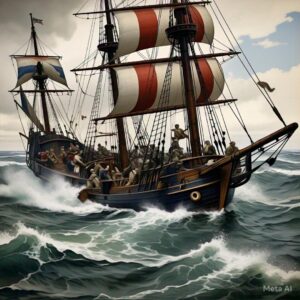Peter TordenSkjold: The Bold Captain

Peter Wessel, also known as Tordenskjold (Norwegian for Thunder Shield), was born in 1690 in Trondheim, Norway. The Great Northern War began in 1700, creating a high demand for skilled naval officers. Wessel quickly showed talent for seamanship and naval tactics. His early assignments, including patrols and escort duties, provided practical experience in naval warfare and command.
On July 26, 1714, near Lindesnes, Wessel, aboard the Løvendals Gallej and flying a Dutch flag, encountered a frigate under the British flag.
This frigate was the De Olbing Galley, armed with 28 guns, outfitted in Great Britain for the Swedish navy, and commanded by a British captain named Bactmann, en route to Gothenburg. The De Olbing Galley signaled for Wessel’s ship to approach. Upon Wessel hoisting the Danish flag, Bactmann initiated combat with a broadside.
The battle with the British captain was a fierce challenge for Wessel. It lasted all day, and when the De Olbing Galley tried to flee in the evening, Wessel pursued, continuing the fight until nightfall. The next morning, the skirmish resumed without a clear victor.
“In a bold move, he messaged the British ship, thanking them for the duel and humorously requesting ammo. The request was denied, but the two captains shared a toast before parting ways.”
After 14 hours of intense combat, b oth ships were heavily damaged, and Wessel was nearly out of ammunition. In a bold move, he messaged the British ship, thanking them for the duel and humorously requesting ammo. The request was denied, but the two captains shared a toast before parting ways.
oth ships were heavily damaged, and Wessel was nearly out of ammunition. In a bold move, he messaged the British ship, thanking them for the duel and humorously requesting ammo. The request was denied, but the two captains shared a toast before parting ways.
Upon learning of this event, King Frederick IV of Denmark ordered a court-martial for Wesse (Remember Denmark and Norway were one nation back then). In November 1714, Wessel stood trial, accused of revealing crucial military information about his ammunition shortage to the enemy and risking King Frederick IV’s ship by engaging with a superior force.
Wessel defended himself spiritedly, critiquing the timidity of his less daring peers, which caught the king’s attention. Wessel cited a provision in the Danish naval code that required pursuing fleeing enemy vessels regardless of their size. Wessel’s defense led to his acquittal on December 15, 1714. Subsequently, he approached King Frederick IV for a promotion and was appointed captain on December 28, 1714.
